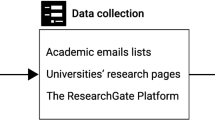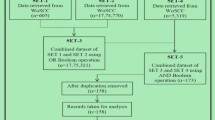Abstract
Doing justice to the often-ridiculed medieval catechism, this article identifies individual-level barriers to an efficient publication strategy in political science and beyond. I argue that becoming a successful and innovative academic writer needs a clear understanding of the (unholy) trinity between authors, reviewers and editors. Based on the analysis of the publication market, I introduce the ‘seven deadly sins of academic writing’ and conclude with uncle G.'s official list of publication virtues that promise increasing research productivity.
Similar content being viewed by others
Notes
Merton (1968) referenced the bible to lend Mathew's name to this meritocratic principle. In particular, Matthew 25:29 reads: ‘For to all those who have, more will be given, and they will have an abundance; but from those who have nothing, even what they have will be taken away’.
Gerber and Malhotra (2008) demonstrate that publication bias is also widespread in top political science journals.
Attentive readers will note that this article is no exception to the rule of self-proportion, as this piece includes two self-references (Schneider, 2005, 2007)!
The Journal of Tautologies and the Academy of Robust Regression can function as close substitutes.
This is my third Empirical Law. The first one states that ‘The further away you are geographically in your attempt to theorise the European Union, the more general is your theory.’ The second empirical law is similar, and holds that ‘The further north you are in Europe, the thicker is your pizza crust’.
Kraus correctly classified this insight under the title ‘Professional secret’.
This recommendation has been attributed to Erich Weede (see Schneider 2005: 258).
GRÖPAZ stands for ‘Größter Politologe aller Zeiten’.
References
Bertheau, F. (1888) Göthe und seine Beziehungen zur schweizerischen Baumwoll-Industrie nebst dem Nachweis, dass unter Frau Susanna der Fabrikantenfrau in Wilhelm Meisters Wanderjahren Frau Barbara Schulthess in Zürich zu verstehen ist, Wetzikon, Switzerland: Aktien-Buchdr.
Cherkashin, I., Demidova, S., Imai, S. and Krishna, K. (2009) ‘The inside scoop: Acceptance and rejection at the journal of international economics’, Journal of International Economics 77: 120–132.
Ellison, G. (2002a) ‘The slowdown of the economics publishing process’, Journal of Political Economy 110 (5): 947–993.
Ellison, G. (2002b) ‘Evolving standards for academic publishing: A q-r theory’, Journal of Political Economy 110 (5): 994–1034.
Fowler, J.H. and Aksnes, D.W. (2007) ‘Does self-citation pay?’ Scientometrics 72 (3): 427–437.
Gans, J.S. and Shepherd, G.B. (1994) ‘How are the mighty fallen: Rejected classic articles by leading economists’, Journal of Economic Perspectives 8 (1): 165–179.
Gerber, A. and Malhotra, N. (2008) ‘Do statistical reporting standards affect what is published? Publication bias in two leading political science journals’, Quarterly Journal of Political Science 3 (3): 313–326.
Hirsch, J. (2005) ‘An index to quantify an individual's scientific research output’, Proceedings of the National Academy of Sciences 102 (46): 569–572.
Kraus, K. (1925) ‘Die Fackel 697-705’, http://corpus1.aac.ac.at/fackel/, accessed 11 May 2011.
Merton, R.K. (1968) ‘The Matthew effect in science’, Science 57: 68–72.
Rabin, M. (1998) ‘Psychology and economics’, Journal of Economic Literature 36 (1): 11–46.
Sand-Jensen, K. (2007) ‘How to write consistently boring scientific literature’, Oikos 116: 723–727.
Schneider, G. (2005) ‘Erich Weede: A nonconformist conflict researcher’, European Political Science 4 (3): 256–262.
Schneider, G. (2007) ‘The search for the holy grant: (Mis)allocating money in European political science’, European Political Science 6 (2): 160–168.
Shalvi, S., Baas, M., Handgraaf, M.J.J. and De Dreu, C.K.W. (2010) ‘Write when hot – Submit when not: Seasonal bias in peer review or acceptance?’ Learned Publishing 23 (2): 117–123.
Starbuck, W. (2005) ‘How much better are the most prestigious journals? The statistics of academic publication’, Organization Science 16 (2): 180–200.
Wittgenstein, L. (2003[1922]) Tractatus Logico-Philosophicus, Frankfurt: Suhrkamp.
Author information
Authors and Affiliations
Additional information
This article is based on an invited presentation to the Political Science Faculty at the University of Edinburgh in September 2010 and a subsequent lecture within the Academic Staff Development Programme at the University of Konstanz in November 2011. I would like to thank the audiences as well as two reviewers for their comments and for clearly distinguishing between my serious, and my not so serious, messages. Readers who recognize themselves in my descriptions of the academic deadly sins can rest assured that this text is almost entirely autobiographical. Notwithstanding the author's own frequent failures, they should nevertheless occasionally consider the Latin proverb: ‘Qui dormit non peccat’ (He who sleeps does not sin’).
Unsurprisingly, the most popular deadly sin in a 1993 MTV survey of entertainers was lust (http://whitestonejournal.com/index.php/seven-deadly-sins, last consulted 3 January 2011).
Rights and permissions
About this article
Cite this article
Schneider, G. How to Avoid the Seven Deadly Sins of Academic Writing. Eur Polit Sci 10, 337–345 (2011). https://doi.org/10.1057/eps.2011.32
Published:
Issue Date:
DOI: https://doi.org/10.1057/eps.2011.32




